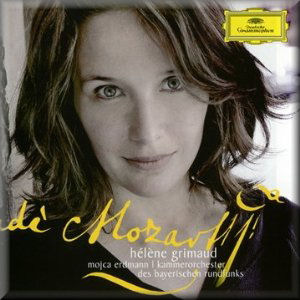 |
 |
|


alternatively
CD: MDT |
Wolfgang Amadeus MOZART
(1756-1791)
Piano Concerto No. 19 in F major, K459 (1784) [38:18]
Aria, “Ch’io mi scordi di te? - Non temer, amato bene”,
K505 [10:15]
Piano Concerto No. 23 in A major, K488 (1786) [18:05]
 Hélène Grimaud (piano)
Hélène Grimaud (piano)
Mojca Erdmann (soprano)
Kammerorchester des Symphonieorchesters des Bayerischen Rundfunks
rec. May 2011, Prinzregententheater, (concertos) and July 2011,
Herkulessaal, Residenz, Munich (aria). DDD
 DEUTSCHE GRAMMOPHON 477 9455 [64:18]
DEUTSCHE GRAMMOPHON 477 9455 [64:18]
|
|
|
This new disc from the French pianist Hélène Grimaud
is her first recording of Mozart piano concertos. This thoughtful
artist has provided a typically enterprising program, combining
two of Mozart’s middle period concertos with an aria for
soprano and piano obbligato. The operatic connection is appropriate:
in these concertos one often hears the overflowing high spirits
of Mozart’s comic operas, alternating with moments of
intense sadness, especially in the great slow movement of K488.
No conductor is credited; Grimaud does not appear to have directed
the orchestra from the keyboard à la Daniel Barenboim
or Mitsuko Uchida’s recent recordings, so it appears that
this role was undertaken by the leader Radoslaw Szulc. These
recordings are taken from live performances given in the Prinzregententheater,
Munich, but the audience only makes its presence felt by its
applause following the final track.
K459 begins with a relatively brisk tempo. The exposition is
played in a somewhat understated fashion, with everything very
neat and shipshape. The careful dynamic shaping and forward
wind parts confirm that this is a modern instruments orchestra
influenced by the historically informed performance school.
Hélène Grimaud’s approach to the solo part
is more old school, sounding rather Beethovenian at times. Her
playing has warmth, while avoiding sentimentality and the preciousness
that can afflict pianists making an occasional essay into Mozart.
The passage-work can get a bit monotonous however and rarely
dips below mezzo-forte. The slow movement is spacious with the
orchestral introduction being again of a high standard. The
understated phrasing gives the music an air of dignity. The
dialogues between the soloist and the woodwinds are beautifully
done. The minor key episode turns the intensity up a notch.
The finale opens in high spirits and the fugal episode is launched
with great precision and a sense of enjoyment. Grimaud continues
in similar vein to the first movement, banging out the descending
octaves in the left hand in quite a hefty fashion. The opera
bouffe mood of the opening is kept in sight and the work concludes
in that slightly over-excited mood that Mozart finales can reach.
The opening movement of K488 is taken again at a fairly brisk
tempo though there is a slight rallentando for the second subject,
rather in the vein of Nikolaus Harnoncourt. There is much to
admire in the orchestra, with some beautifully shaped phrasing
and luminous sound. Grimaud’s playing falls short of this
degree of refinement however and rarely falls below mezzo-forte.
She maintains this dynamic even when the woodwinds have the
melody. Her cadenza, interestingly, is by Busoni, in which she
sounds a little more at home than previously. The slow movement
is very slow and is played with great concentration; the speed,
unfortunately, robs it of any feeling of a Siciliano. The finale
finds Mozart back in opera bouffe manner; this is one of his
most infectious moto perpetuo movements, and Grimaud
and the orchestra keep the pot boiling merrily until the end.
She sounds more comfortable with its more virtuosic writing,
although there is again a lack of dynamic light and shade.
The aria is taken from the revised Idomeneo, and is a
tasty palate-cleanser between the concertos; Grimaud and the
young soprano Mojca Erdmann display a fine rapport.
Mitsuko Uchida’s Mozart cycle with Jeffrey Tate and the
English Chamber Orchestra was released in 2006, although the
individual concerto recordings date back to the 1980s. The orchestra
plays in more traditional style than their Bavarian counterparts,
somewhat like the Academy of St. Martin-in-the-Fields who also
recorded a Mozart cycle with Alfred Brendel. Wind parts are
quite forward and there is some nice dynamic shading from Tate.
By contrast with the orchestra, Uchida is quite self-effacing;
her tone is softer than Grimaud’s, and she has no problem
receding into the background when another part has the melody.
Her performances strike a basic tempo and mostly stick to that,
with occasional fluctuations that are handled with great understanding
between soloist and conductor. Some will find Uchida a bit too
reticent, but I feel her approach has several advantages over
that of Grimaud. First, it preserves the partnership that would
have existed between a fortepiano and orchestra in Mozart’s
time, with the bigger voice of the modern piano providing something
in reserve. Second, one does not tire of her sound. Uchida and
Tate are also very consistent throughout the cycle, something
that might be overlooked but which speaks volumes for their
musicianship.
I greatly enjoyed Hélène Grimaud’s previous
recordings of Chopin, Brahms and Schumann, and so was favourably
disposed towards this release. I can’t summon up the same
enthusiasm for her Mozart, however, which I found a bit heavy-footed.
Nevertheless Mozart style is a personal thing, and those who
find many performances of this composer mincing and over-delicate
may well enjoy these. On the positive side the orchestral contribution
is of a very high class, and the aria between the concertos
works well. Together with the extra electricity of the live
recording, these factors combine to give this Mozart recording
a most distinctive character.
Guy Aron
|
|












